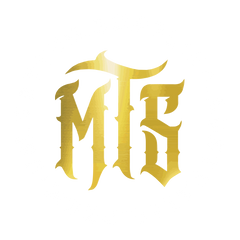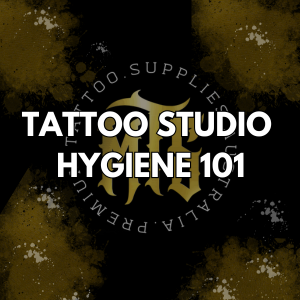Tattoo Studio Hygiene: What Every Artist Needs to Know
Choosing to become a tattoo artist means more than mastering your craft. It also means taking full responsibility for maintaining strict hygiene standards. These practices are vital for protecting both you and your clients from infections, bloodborne pathogens, and other serious health risks.
Cross-Contamination and Why It Matters
Cross-contamination happens when bacteria or viruses are transferred from one person to another through shared surfaces. These harmful agents can live outside the body for up to a week, creating a real risk of infection if your studio isn't cleaned properly. Blood and bodily fluids from clients can easily end up on machines, tools, or even your workstation. If these are not thoroughly disinfected, they can pose a major health risk to the next client. That is why sterilizing every single item you use, from machines to trays, is not just good practice. It is absolutely essential.
The Basics Every Artist Should Understand
Before you touch your first machine, you need to be fully informed about the health risks involved in tattooing and how to avoid them. This means understanding how bloodborne pathogens like hepatitis B (HBV), hepatitis C (HCV), and HIV can be transmitted. Personal hygiene plays a major role too, and something as simple as frequent handwashing can go a long way in preventing infection. Learning how to prevent cross-contamination using gloves, disinfectants, and sterilization techniques is key. You also need to know how to clean and set up your workspace properly so you can maintain a sterile environment from the beginning of the session to the end.
Sterilization Starts with the Right Tools
Your choice of disinfectant matters. It must be strong enough to eliminate dangerous viruses like HIV, HBV, and HCV. Never dilute these products or store them in unmarked containers. Always follow the manufacturer's guidelines. If you use reusable tools, an ultrasonic cleaner is essential for breaking down dried pigment and blood. Lighting is another important factor that helps you spot anything that might be missed otherwise. Investing in an autoclave is one of the smartest moves you can make. It ensures your non-disposable tools are completely sterile before each session and reinforces your professionalism.
Keep Your Work Area Safe and Clean
Your workstation should be built for easy cleaning. Stick with non-absorbent materials like stainless steel, aluminum, tempered glass, or certain plastics. Avoid wood or fabric, as they are much harder to disinfect. Only store essential tools on your trolley. Keep distractions like phones or snacks out of your sterile area.
When it comes to chairs, use materials like vinyl or leather that can be wiped down thoroughly. Consider using disposable covers between sessions for extra protection, but remember they do not replace proper disinfection.
Flooring also plays a key role. Choose tile, linoleum, or polyvinyl surfaces that are easy to mop and sanitize. Make it a habit to disinfect your floors before and after each client. A nearby wash station is also essential so you can wash your hands with antibacterial soap and dry them with disposable paper towels. Avoid cloth towels since they can quickly become breeding grounds for bacteria.
Use Disposable Equipment and Use It Once
Disposable tools are made for one reason and that is single use. This includes gloves, razors, needles, and paper towels. It does not matter if the client is a friend, a family member, or someone returning for more work. Every session must involve a fresh set of disposable items. Reusing them not only puts clients at risk, it also damages your reputation and could lead to serious consequences for your studio.
Caring for Your Machines
Tattoo machines and clip cords need to be thoroughly cleaned after every use. During sessions, use a machine bag or barrier film to keep equipment clean and minimize contamination. These simple steps make it much easier to maintain a sterile setup, especially when dealing with hard-to-reach areas in coil machines or pen-style tools.
A pen-style tattoo machine should always be wrapped in a way that keeps it fully covered and protected to maintain hygiene during use. This usually involves using a machine bag or clip cord sleeve to cover the body of the pen, then securing it around the grip and wrapping that area with cohesive grip tape for comfort and control. If you're using a cord, that should be sleeved too, or if it's wireless, the battery should be covered separately. The goal is to prevent any contact between the machine and contaminants like ink, blood, or plasma while keeping your setup clean and professional.
Hygiene is not just part of being a professional tattoo artist. It is the foundation. Whether you are new to the industry or have been tattooing for years, maintaining a clean, sterile studio is just as important as creating great artwork. Every course you take and every studio session you run should reflect that commitment.
Never cut corners when it comes to cleanliness. Do not hesitate to toss out a pair of gloves or grab a fresh roll of paper towels. These products are designed to be used once and then thrown away. Prioritizing safety over cost keeps everyone healthy, builds trust with your clients, and helps your studio thrive.


